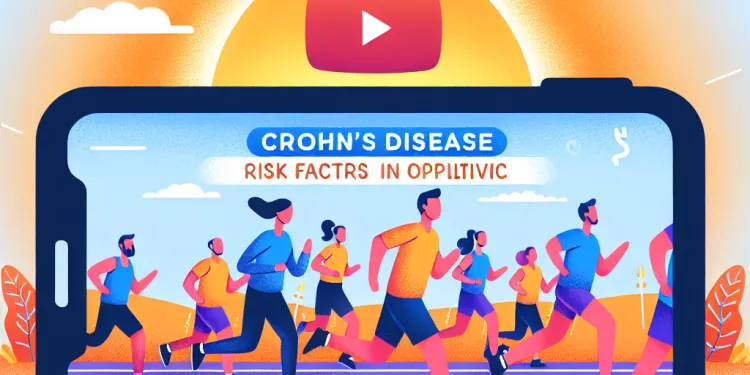
Find Help
More Items From Ergsy search
-

Is Crohn's disease contagious?
Relevance: 100%
-

Is there a cure for Crohn's disease?
Relevance: 66%
-

What is Crohn’s disease and how is it treated?
Relevance: 66%
-

What causes Crohn's disease?
Relevance: 64%
-

How is Crohn's disease diagnosed?
Relevance: 64%
-

Is surgery necessary for Crohn's disease?
Relevance: 62%
-

Are there any complications associated with Crohn's disease?
Relevance: 61%
-

Who is at risk of developing Crohn's disease?
Relevance: 61%
-

Can children develop Crohn's disease?
Relevance: 61%
-

What is the best diet for Crohn’s disease?
Relevance: 61%
-

What are the common symptoms of Crohn's disease?
Relevance: 61%
-

What treatments are available for Crohn's disease?
Relevance: 60%
-

Can stress make Crohn's disease worse?
Relevance: 59%
-

How does smoking affect Crohn's disease?
Relevance: 59%
-

What support is available for people with Crohn's disease in the UK?
Relevance: 59%
-

What dietary changes can help manage Crohn's disease?
Relevance: 55%
-

Is flesh-eating disease contagious?
Relevance: 52%
-

Infliximab infusion (Remicade) for Crohns Disease at Addenbrookes NHS hospital
Relevance: 49%
-

Is Lyme disease contagious between humans?
Relevance: 47%
-

Is chickenpox contagious?
Relevance: 42%
-

Is eczema contagious?
Relevance: 42%
-

Is meningitis contagious?
Relevance: 39%
-

How contagious is measles?
Relevance: 39%
-

Is shingles contagious?
Relevance: 37%
-

Is impetigo contagious?
Relevance: 37%
-

Is shingles contagious?
Relevance: 36%
-

Are nits contagious?
Relevance: 35%
-

How long is a person with measles contagious?
Relevance: 34%
-

Is the Nimbus variant more contagious?
Relevance: 34%
-

Are cold sores contagious?
Relevance: 33%
-

Is the Super Flu contagious?
Relevance: 33%
-

Is scabies contagious?
Relevance: 33%
-

Is the bubonic plague contagious between humans?
Relevance: 33%
-

Is nettle rash contagious?
Relevance: 32%
-

Is chronic fatigue syndrome contagious?
Relevance: 32%
-

Are E. coli infections contagious?
Relevance: 31%
-

What is Lyme Disease?
Relevance: 25%
-

What is a flesh-eating disease?
Relevance: 24%
-

What is sickle cell disease?
Relevance: 24%
-

What is a flesh eating disease?
Relevance: 24%
Is Crohn's Disease Contagious?
Crohn's disease is a type of inflammatory bowel disease (IBD) that causes inflammation of the digestive tract. This condition can lead to symptoms such as abdominal pain, severe diarrhea, fatigue, weight loss, and malnutrition. Whereas its exact cause is not fully understood, there are common questions regarding its contagious nature. In addressing concerns within the UK, it's essential to dispel myths and provide clear information about Crohn's disease.
Understanding Crohn's Disease
Crohn's disease is believed to be an autoimmune condition, where the immune system mistakenly attacks healthy cells in the digestive tract. Factors contributing to this disease include genetics, environmental influences, and an abnormal immune response. In the UK, like in many other countries, research continues to explore these factors. However, it is crucial to understand that Crohn's disease is a chronic non-infectious disease.
Why Crohn's Disease Is Not Contagious
Crohn's disease is not caused by bacteria, viruses, or any other infectious agents that are typically transmitted from person to person. This means you cannot catch Crohn's disease through contact with a person suffering from it, nor through sharing food, drinks, or utensils. The disease is related to genetic predispositions and immune system responses, none of which can be spread through contact or proximity.
Genetic and Environmental Influences
Research suggests that genetics play a significant role in the predisposition to Crohn's disease. If you have a close family member with Crohn's, your chances of developing the condition might be higher. However, even with genetic predispositions, environmental factors, including diet and stress levels, can impact disease development. In the UK, studies into lifestyle factors continue to provide insights into better managing and potentially mitigating the progression of Crohn's disease.
Living with Crohn's in the UK
For those living with Crohn's in the UK, understanding that the disease is not contagious might offer some relief from social stigma. Support structures, including healthcare systems and support groups, play vital roles in managing the condition. Patients are encouraged to communicate openly with healthcare providers to develop personalized management plans, involving medication, lifestyle adjustments, and support networks to enhance life quality despite the challenges posed by Crohn's disease.
Is Crohn's Disease Contagious?
Crohn's disease is a problem with the belly and intestines. It makes parts of the digestive system red and swollen. People with Crohn's disease might have tummy pain, diarrhea, feel very tired, lose weight, and not get enough nutrients. Some people worry that they can catch Crohn's disease from others, but let's find out if that's true and explain it simply.
Understanding Crohn's Disease
Crohn's disease happens because the body's defense system, called the immune system, attacks parts of the digestive system by mistake. This might be due to genetics (something in your family), things around you, or an immune system that doesn't work right. Scientists in the UK and other places are still trying to learn more about it. But it is very important to know that Crohn's disease is not something you can catch from someone else. It is a long-lasting illness that doesn't spread.
Why Crohn's Disease Is Not Contagious
You cannot get Crohn's disease from germs like bacteria or viruses that spread from person to person. This means you will not catch Crohn's if you touch someone who has it or if you eat or drink with them. It is about your genes and how your immune system works, which cannot be passed to others by being near them.
Genetic and Environmental Influences
Scientists think that your genes can influence if you might get Crohn's disease. If someone in your family has Crohn's, you might have a higher chance of getting it too. But things like what you eat and stress can also make a difference. Researchers in the UK are looking into how these things can affect Crohn's disease, which helps in finding better ways to manage it.
Living with Crohn's in the UK
If you have Crohn's in the UK, it's good to know you cannot pass it to others. This might help reduce worries from those around you. There are many people and groups ready to help you live with Crohn's. Healthcare workers and support groups can be very helpful. They can help create a plan just for you, which might include medicine, lifestyle changes, and support from others. This can help you live well even with Crohn's disease.
Frequently Asked Questions
Is Crohn's disease contagious?
No, Crohn's disease is not contagious. It is a chronic inflammatory bowel disease that is thought to result from a combination of genetic, environmental, and immune system factors.
Can Crohn's disease be transmitted through food or water?
No, Crohn's disease cannot be transmitted through food or water. It is not infectious and does not spread from person to person.
How is Crohn's disease different from a stomach bug?
A stomach bug, or gastroenteritis, is usually caused by a virus or bacteria and is contagious, whereas Crohn's disease is a long-term condition caused by inflammation in the digestive tract and is not contagious.
What are the main causes of Crohn's disease if it's not contagious?
While the exact cause of Crohn's disease is unknown, it is believed to be due to a mix of genetic predisposition, an abnormal immune response, and possibly environmental factors.
Can someone with Crohn's disease have a normal life expectancy?
Yes, most people with Crohn's disease have a normal life expectancy, although they may experience periods of active symptoms and remission.
What are common symptoms of Crohn's disease?
Common symptoms include abdominal pain, diarrhea, fatigue, weight loss, and sometimes fever. Severity can vary over time and among individuals.
How is Crohn's disease diagnosed in the UK?
Diagnosis typically involves a combination of blood tests, stool tests, endoscopic procedures, imaging studies like MRI or CT scans, and patient history.
Is there a cure for Crohn's disease?
Currently, there is no cure for Crohn's disease, but treatments are available that can help control symptoms and reduce inflammation.
What treatment options are available for Crohn's disease?
Treatment options may include medication, lifestyle changes, dietary adjustments, and sometimes surgery. The specific treatment plan depends on the individual case.
Does diet affect Crohn's disease symptoms?
Yes, diet can influence symptoms. Some people find that certain foods exacerbate their symptoms, while others may provide relief. It's often recommended to work with a dietitian.
Can stress trigger Crohn's disease flare-ups?
While stress itself does not cause Crohn's disease, it can worsen symptoms or trigger flare-ups in some individuals.
Are there support groups for Crohn's disease in the UK?
Yes, there are several support groups and organisations, such as Crohn's & Colitis UK, that offer resources and community support for those affected by Crohn's disease.
How often are check-ups recommended for someone with Crohn's disease?
Regular check-ups are recommended, but the frequency can vary depending on the severity of the condition and how well it is being managed.
Can children have Crohn's disease?
Yes, Crohn's disease can be diagnosed at any age, including in children and adolescents, though it is most commonly diagnosed in young adults.
How does Crohn's disease impact daily life?
The impact varies among individuals. Some manage with few symptoms, while others may experience significant discomfort. It can affect physical activity, diet, and social life.
Can you catch Crohn's disease from someone else?
No, you can't catch Crohn's disease from someone else. It's a long-lasting problem that affects the gut. It happens because of a mix of genes, things around us, and how our body fights illness.
Can you catch Crohn's disease from food or water?
No, you cannot catch Crohn's disease from food or water. It is not spread in the way colds or the flu are. Crohn's disease is a health problem that affects the body on the inside. It is not something you catch from other people, food, or drinks.
If reading is hard, you can use tools like audiobooks or text-to-speech apps to help you understand better. Asking someone to explain can also be a good idea.
No, you cannot catch Crohn's disease from food or water. It is not something you can spread to other people.
What makes Crohn's disease different from a tummy bug?
Here is a simple way to understand:
- Crohn's Disease: This is a sickness you can have for a long time. It makes your tummy hurt, especially the part called the intestines. People might feel really tired and might need special medicine from a doctor.
- Tummy Bug: This is when your tummy hurts for just a few days. Sometimes it makes you feel sick or have to go to the toilet a lot. It usually goes away by itself.
Tools to help:
- Look at pictures: Sometimes seeing pictures helps to understand words better.
- Ask a helper: Someone you trust can help explain big words.
A stomach bug is an illness that makes your tummy upset. It is often caused by germs like a virus or bacteria. You can catch it from other people.
Crohn's disease is different. It is an illness that lasts a long time. It happens when there is swelling inside your tummy. You cannot catch Crohn's disease from someone else.
If you need more help reading, you can ask someone to read it with you or use an app that reads text out loud.
Why do people get Crohn's disease if you can't catch it?
Crohn's disease is a sickness in the belly. You can't get it from someone else.
Doctors think these things might cause it:
- Your body's defense system might not work right.
- It might be passed down in families.
- The food you eat or things around you might make it happen.
Try using pictures or videos to understand better. Talking to a helper can also make it easier.
Doctors don't know exactly why people get Crohn's disease. But it might be because of a mix of things like family genes, the body's defense system not working right, and maybe things around us like food or pollution.
To help read this, try using a ruler or piece of paper to follow along line by line. You can also ask someone to read it out loud with you.
Can someone with Crohn's disease live as long as others?
Crohn's disease is a sickness that affects your tummy. People with Crohn's can live as long as everyone else. But, they might need medicine and help from doctors.
Here are some tips to help:
- Visit your doctor for regular check-ups.
- Take your medicine as your doctor tells you.
- Eat healthy food.
- Rest when you are tired.
- If you need help, ask your family or a nurse.
Yes, most people with Crohn's disease can live as long as other people. But sometimes, they might feel sick, and other times, they may feel better.
What are common signs of Crohn's disease?
Crohn's disease can make you feel unwell. Here are some signs you might have it:
- Stomach pain or cramps
- Feeling tired a lot of the time
- Diarrhea that won't go away
- Losing weight without trying
- Not feeling hungry
- Having a fever
If you have these signs, talk to a doctor. Picture books, simple videos, or talking with someone you trust can help you understand more.
Common symptoms are tummy pain, runny poo, feeling very tired, losing weight, and sometimes having a fever. How bad these can be is different for everyone and can change over time.
If you find it hard to understand these words, ask someone to explain them to you. You can also use picture cards or apps to help understand what these words mean.
How do doctors find out if you have Crohn's disease in the UK?
Doctors use tests to see if someone has Crohn's disease.
First, they ask about your health and how you feel.
Next, they might do some tests. These can be:
- Blood test: This checks your blood for signs of Crohn's.
- Stool test: This looks at your poop for problems.
- Endoscopy: A small camera looks inside your tummy.
- Biopsy: They take a tiny piece of your insides to look at under a microscope.
- Scan: Pictures are taken of your body with special machines, like X-rays or MRI.
You can ask a family member, friend, or carer to help explain these tests.
If you find reading hard, you can ask someone to read to you. You can also use pictures to understand better.
Doctors use different tests to find out what is wrong. They might take a little bit of your blood to test it. They might also check your poo. Sometimes, they use a camera to look inside your tummy. They might use special machines to take pictures inside your body, like an MRI or CT scan. They will also ask you questions about how you feel and if you've had any problems before.
Can doctors make Crohn's disease go away completely?
Crohn's disease is a sickness that affects the tummy, making it hurt. Right now, doctors can't make it go away forever. But there are medicines and things to help feel better.
To feel better, people with Crohn's can:
- Take medicines. These help stop the pain and make the tummy feel calmer.
- Talk to a doctor often. Doctors can check how the person is doing and change the treatment if needed.
- Eat foods that are good for the tummy. Some foods can help people feel better.
- Relax and get lots of rest.
Having support from family, friends, and talking to a helper can make things easier too.
Right now, there is no way to make Crohn's disease go away. But there are ways to help feel better and make the tummy less sore.
What can help people with Crohn's disease feel better?
Crohn's disease can make your tummy hurt and make you feel sick. Here are some ways people with Crohn’s can feel better:
- Meds: Doctors can give special medicine to help calm your tummy.
- Food: Eating certain foods can make you feel better. A dietitian can help make a yummy plan.
- Rest: Getting lots of sleep and rest can help your body heal.
- Talking: Some people find it helpful to talk to a doctor or a helper about how they feel.
If you know someone with Crohn’s, you can help by listening to them and being a good friend.
There are different ways to help. These can include taking medicine, changing how you live your life, eating different foods, and sometimes having an operation. The best way to help you will depend on what’s happening with you.
Can what you eat change Crohn's disease symptoms?
Crohn's disease is a sickness that affects the tummy and gut. Some foods might make the symptoms feel worse. Other foods might make you feel better.
Here are some tips to help:
- Keep a food diary: Write down what you eat and how you feel. This can help you see what foods are good or bad for you.
- Talk to a doctor or a dietitian: They can give you advice on what to eat.
- Eat small meals: Eating smaller amounts can be gentle on your tummy.
- Try soft foods: Foods that are soft and easy to chew might help.
Remember, everyone is different. It's important to find what works best for you.
Yes, what you eat can change how you feel. Some foods might make you feel worse. Other foods might help you feel better. It is a good idea to talk to a food expert called a dietitian.
Can stress make Crohn's disease worse?
Stress can make Crohn's disease symptoms worse. It's good to find ways to relax, like deep breathing or talking to someone. These can help you feel better.
Stress does not make Crohn's disease start, but it can make symptoms worse or cause flare-ups for some people.
Are there groups in the UK that help people with Crohn's disease?
Yes, there are groups in the UK that help people with Crohn's disease.
They are called support groups.
In these groups, you can talk to others who have Crohn's disease.
You can share your feelings and get advice.
To find a group, you can:
- Look online for Crohn's support groups in your area.
- Ask your doctor for information.
Talking to people who understand you can make you feel better.
Yes, there are groups that can help you. One group is called Crohn's & Colitis UK. They give support and have helpful things for people with Crohn's disease.
How often should someone with Crohn's disease see the doctor?
If you have Crohn's disease, it's important to see your doctor.
Your doctor will tell you how often you need check-ups. Usually, people with Crohn's visit the doctor at least once a year.
Visiting your doctor helps you stay healthy. Your doctor can check if your medicine is working or if you need any changes.
Ask your doctor if you have any questions. It's okay to bring a friend or family member to help you remember things.
It's good to see the doctor for check-ups. How often you go can change. It depends on how bad your sickness is and how well you are getting better.
Can kids get Crohn's disease?
Crohn's disease is an illness that affects your tummy. Kids can have it too. It might make their tummy hurt or feel sick a lot.
If you think your child's tummy hurts a lot, talk to a doctor. They can help. Reading with an adult or listening to stories about health can also help you learn. Using pictures and simple words can make it easier to understand.
Special apps or videos made for kids can show what Crohn's disease is and how to take care of it.
Yes, doctors can find out if someone has Crohn's disease no matter how old they are. Kids and teenagers can have it too, but most often, young adults get checked for it.
How does Crohn's disease affect daily life?
Crohn's disease is a sickness that hurts your tummy.
It can make you feel sick often.
It can make going to school or work harder.
Sometimes, you need to use the bathroom a lot.
You might feel very tired.
Eating some foods might hurt your tummy.
Talking to a doctor can help.
Using a planner or calendar can help remember what to do each day.
Friends and family can give support.
People feel different things. Some people feel okay, but others can feel really bad. It can make it hard to play, eat, or be with friends.
It helps to ask someone for support if you feel bad. You can try using pictures or videos to understand better. Talking to a friend or family member can also help.
Useful Links
This website offers general information and is not a substitute for professional advice.
Always seek guidance from qualified professionals.
If you have any medical concerns or need urgent help, contact a healthcare professional or emergency services immediately.
Some of this content was generated with AI assistance. We’ve done our best to keep it accurate, helpful, and human-friendly.
- Ergsy carfully checks the information in the videos we provide here.
- Videos shown by Youtube after a video has completed, have NOT been reviewed by ERGSY.
- To view, click the arrow in centre of video.
- Most of the videos you find here will have subtitles and/or closed captions available.
- You may need to turn these on, and choose your preferred language.
- Go to the video you'd like to watch.
- If closed captions (CC) are available, settings will be visible on the bottom right of the video player.
- To turn on Captions, click settings .
- To turn off Captions, click settings again.
More Items From Ergsy search
-

Is Crohn's disease contagious?
Relevance: 100%
-

Is there a cure for Crohn's disease?
Relevance: 66%
-

What is Crohn’s disease and how is it treated?
Relevance: 66%
-

What causes Crohn's disease?
Relevance: 64%
-

How is Crohn's disease diagnosed?
Relevance: 64%
-

Is surgery necessary for Crohn's disease?
Relevance: 62%
-

Are there any complications associated with Crohn's disease?
Relevance: 61%
-

Who is at risk of developing Crohn's disease?
Relevance: 61%
-

Can children develop Crohn's disease?
Relevance: 61%
-

What is the best diet for Crohn’s disease?
Relevance: 61%
-

What are the common symptoms of Crohn's disease?
Relevance: 61%
-

What treatments are available for Crohn's disease?
Relevance: 60%
-

Can stress make Crohn's disease worse?
Relevance: 59%
-

How does smoking affect Crohn's disease?
Relevance: 59%
-

What support is available for people with Crohn's disease in the UK?
Relevance: 59%
-

What dietary changes can help manage Crohn's disease?
Relevance: 55%
-

Is flesh-eating disease contagious?
Relevance: 52%
-

Infliximab infusion (Remicade) for Crohns Disease at Addenbrookes NHS hospital
Relevance: 49%
-

Is Lyme disease contagious between humans?
Relevance: 47%
-

Is chickenpox contagious?
Relevance: 42%
-

Is eczema contagious?
Relevance: 42%
-

Is meningitis contagious?
Relevance: 39%
-

How contagious is measles?
Relevance: 39%
-

Is shingles contagious?
Relevance: 37%
-

Is impetigo contagious?
Relevance: 37%
-

Is shingles contagious?
Relevance: 36%
-

Are nits contagious?
Relevance: 35%
-

How long is a person with measles contagious?
Relevance: 34%
-

Is the Nimbus variant more contagious?
Relevance: 34%
-

Are cold sores contagious?
Relevance: 33%
-

Is the Super Flu contagious?
Relevance: 33%
-

Is scabies contagious?
Relevance: 33%
-

Is the bubonic plague contagious between humans?
Relevance: 33%
-

Is nettle rash contagious?
Relevance: 32%
-

Is chronic fatigue syndrome contagious?
Relevance: 32%
-

Are E. coli infections contagious?
Relevance: 31%
-

What is Lyme Disease?
Relevance: 25%
-

What is a flesh-eating disease?
Relevance: 24%
-

What is sickle cell disease?
Relevance: 24%
-

What is a flesh eating disease?
Relevance: 24%


